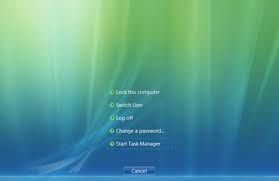 Many have probably use this by pressing CTRL + ALT + Delete on their keyboards. This brings up this screen (on Vista, anyway):
Many have probably use this by pressing CTRL + ALT + Delete on their keyboards. This brings up this screen (on Vista, anyway):You would want to click on the Start Task Manager, and viola, you will see this Window.
The first tab shows the open applications. I find this really doesn't tell the whole story. You can see on the bottom how much of your CPU is being used, and then how much physical memory is being used. Mine is at 83% - getting up there. We can get a better look at how are resources are being used through the "Processes" tab.
As we can see - Google Chrome is eating up quite the memory there. If I had more RAM (Random Access Memory), we might be okay. But with an older machine with only 2 gigabytes of RAM, you truly feel the effects of memory intensive programs. However, I've been noticing recently that the longer Chrome stays open, the more memory it tends to eat, especially my Facebook/Tweetdeck/Google Drive windows. So I simply close down the highest memory processes, which will crash the open tabs, but should leave chrome running. I can just reload the tabs and my computer runs a lot more smoothly.
As always, be sure to research before you close any processes that might be important to running the system.
Understanding and using the Windows Task Manager can help you get the most out of your PC experience, especially when things aren't running quite right. It definitely helps give the feeling of "control" over your computer, when often times it feels like it has a mind of its own!


No comments:
Post a Comment